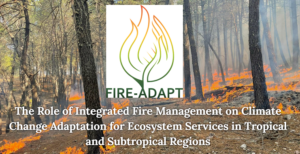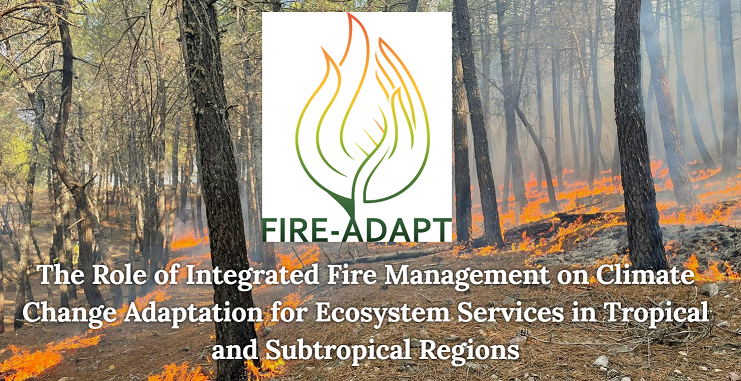
January saw the start of a new project that Colin Prentice and Sandy Harrison are part of. The project is called FIRE-ADAPT, a project that will investigate how integrated fire management contributes to biodiversity, carbon, and cultural values.
In recent years, extreme wildfires have gained a lot of media attention due to fires getting out of control and having devastating impacts and so we tend to have a negative perception of them. Yet, wildfires are a natural part of ecosystems, in fact, many ecosystems rely on fire to survive.
This new project, FIRE-ADAPT will investigate the benefits of fire in nature and society by integrating diverse areas of knowledge, from both the academic and operational world.
“FIRE-ADAPT” is an international, collaborative and interdisciplinary research project, focusing on the role of Integrated Fire Management (IFM) in climate change adaptation for ecosystem services, in tropical and subtropical regions. Specifically, the project will investigate the role of different ecosystem management practices, such as prescribed fire, in enhancing biodiversity, carbon sequestration and values for local communities, which are called ecosystem and cultural services.
To this end, “FIRE-ADAPT” will facilitate the mobilization of researchers and professionals through this knowledge exchange network. Participants will be from the public and private sectors and will participate in exchanges in the 10 European and Latin American partner countries: Spain, France, Italy, Portugal, Colombia, Mexico, Brazil, Bolivia, Argentina and the United Kingdom. This project is a Staff Exchanges program of the Marie Skłodowska-Curie Actions of the European Union, and it has a total budget of 1,278,800 euros.
A key feature of “FIRE-ADAPT” is the realization of the so-called study hubs, which are located in three regions in Latin America and three in Europe where research, training and knowledge exchange meetings will be held. In addition, the study hubs will organize different actions: one will take place in Mexico and will address practical aspects of prescribed burning; another one will be a symposium in Argentina on interdisciplinary approaches to Integrated Fire Management and there will be other study hubs in Brazil, France and Italy that will organize (pyro tours) visits where the use of fire plays a relevant role. The first study hub will take place in mid-year in Catalonia and it will include events open to participants outside the project. There will be some field trips to get to know different areas of Catalonia where forest management has been carried out to prevent wildfires
The project has a novel vision of integrating existing knowledge with newly generated research in different countries. In addition to obtaining scientific results, such as studying carbon dynamics in ecosystems and biodiversity conservation, it aims to transfer them to the general public in a more participatory way.
You can read more on the project website: http://www.fireadapt.eu/en/

